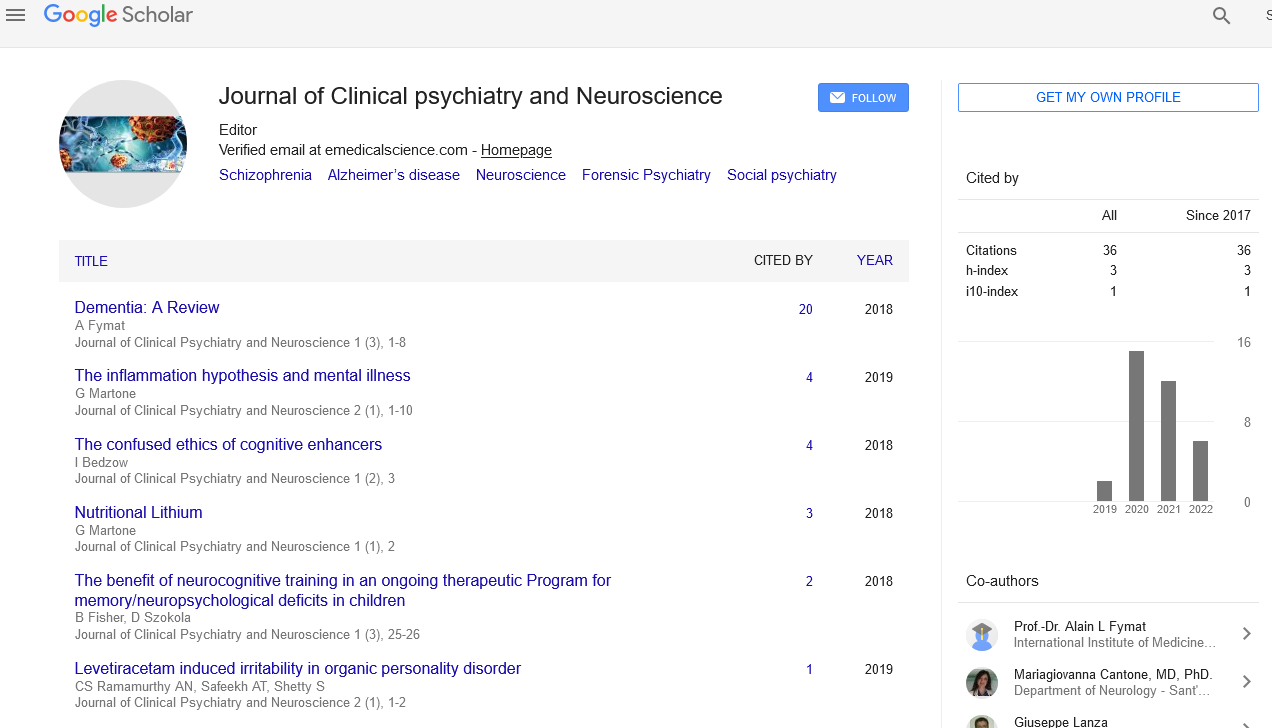Insights into madness and wisdom regarding existential psychiatry
Received: 06-Nov-2022, Manuscript No. PULJCPN-23-6127; Editor assigned: 08-Nov-2022, Pre QC No. PULJCPN-23-6127 (PQ); Accepted Date: Nov 25, 2022; Reviewed: 20-Nov-2022 QC No. PULJCPN-23-6127 (Q); Revised: 22-Nov-2022, Manuscript No. PULJCPN-23-6127 (R); Published: 27-Nov-2022, DOI: 10.37532/puljcpn.2022.5(6).64-5.
Citation: Raul S. Insights into madness and wisdom regarding existential psychiatry. J Clin Psychiatry Neurosci.2022; 5(6):64-5.
This open-access article is distributed under the terms of the Creative Commons Attribution Non-Commercial License (CC BY-NC) (http://creativecommons.org/licenses/by-nc/4.0/), which permits reuse, distribution and reproduction of the article, provided that the original work is properly cited and the reuse is restricted to noncommercial purposes. For commercial reuse, contact reprints@pulsus.com
Abstract
Wisdom and Madness, Vincenzo Caretti and Ronald D. Laing specifically discuss the significant elements of Jungian theory and, in particular, the influence it has had on Laing's thought. Laing admits to being influenced by Jung, specifically symbols of transformation, the reading of which proved indispensable as it introduced original nuances and perspectives through which to read and interpret phenomena, and return to the "mysterious and remote origins" of human being: "Of course, symbols of transformation played a decisive role for me," Laing says. It is a pioneering work for the way my work in psychiatry has been oriented ever since". It is easy to see why Laing regards symbols as innovative and significant.
Key Words
Psychoanalytic Research
Introduction
Laing was able to observe the great tensions and transformations of an ever changing world thanks to the Jungian perspective of analsis, which is distinguished by a focus on complexity, an approach that considers man as inseparable from his cultural environment, the introduction of a theory of archetypal forms, and the hypothesis of the collective unconscious. And as the world changes, so does the psyche, which creates and shapes itself through an extraordinarily creative process of autopoiesis, each time giving rise to something new, to new images and directions, to new meanings with which to attempt to understand its relationship with the outside world and with itself.
Thus, symbols of transformation become a critical text for Laing because it illuminates the problem of human experience (and its 'enigma' or ‘mystery') through the analysis of symbolic experience. The Jungian conception of the unconscious as a mysterious "treasure difficult to attain," whose language is primarily symbolic expressions and images, is a watershed moment in psychoanalytic research. "It was certainly the first time I had come across the use of a mythical scenario in connection with psychological constellations or with a set of transformations in the area of real life, of actual experience," Laing says.
There is a collectivity as well as the individual. According to Laing, situating the individual within the community entails looking at the scope of mental illness by extending the analysis to the person's context of reference, taking into account the person's society and family. Simultaneously, this implies reconsidering man and world, subject and object, not as opposites and incompatible, but in their deep and complex original relationship. As a result, a theoretical and practical perspective that focuses on the complexities of phenomena and the recovery of the "wholeness of human being" is confirmed. "I agree with Jung," Laing says, using the term "phenomenology" specifically.
It is a phenomenology that Laing, for example, repeatedly refers to as 'social' in the politics of experience, because it is primarily concerned with the relationship between my experience of the other and the other's experience of me, that is, with inter experience: Social phenomenology is the study of my own and other people's experiences. It is concerned with the relationship between my perception of you and your perception of me. That is, with crosscultural experience. It is concerned with your and my behavior as I perceive it, as well as your and my behavior as you perceive it. Because your and their experiences are as obscure to me as mine is to you and them.
In other words, "psychology must be free to look at everything that men feel, believe and imagine, not excluding visions, hallucinations and the like". The Jungian theoretical proposal, according to which all aspects of reality, both material and psychic, are strongly interconnected, has undoubtedly played an important role in this attempt to observe complexity. Jungian studies on the 'person' and the theory of archetypes caused Laing to think deeply about the human condition and the need to reconsider, especially through the study of illness (and thus of society), the mystery of the origin of experience, its abyss. The section "the relationship to the patient as a person or thing" in the divided self.
Laingian approach is based on the ability to bring together and link the 'personal' and' social,' man and world, while also giving a central place to the spiritual in psychotherapy during a period of extreme upheaval and unease in contemporary society. It is deeply rooted in phenomenological culture and has an uncanny capacity for empathy. His whole activity is marked by the idea that the analysis of the 'facts of life' can only authentically take place by taking a sort of 'step back', by virtue of which we can go back to those mysterious and remote sources of man: "We come back to ourselves as our own final authority".





